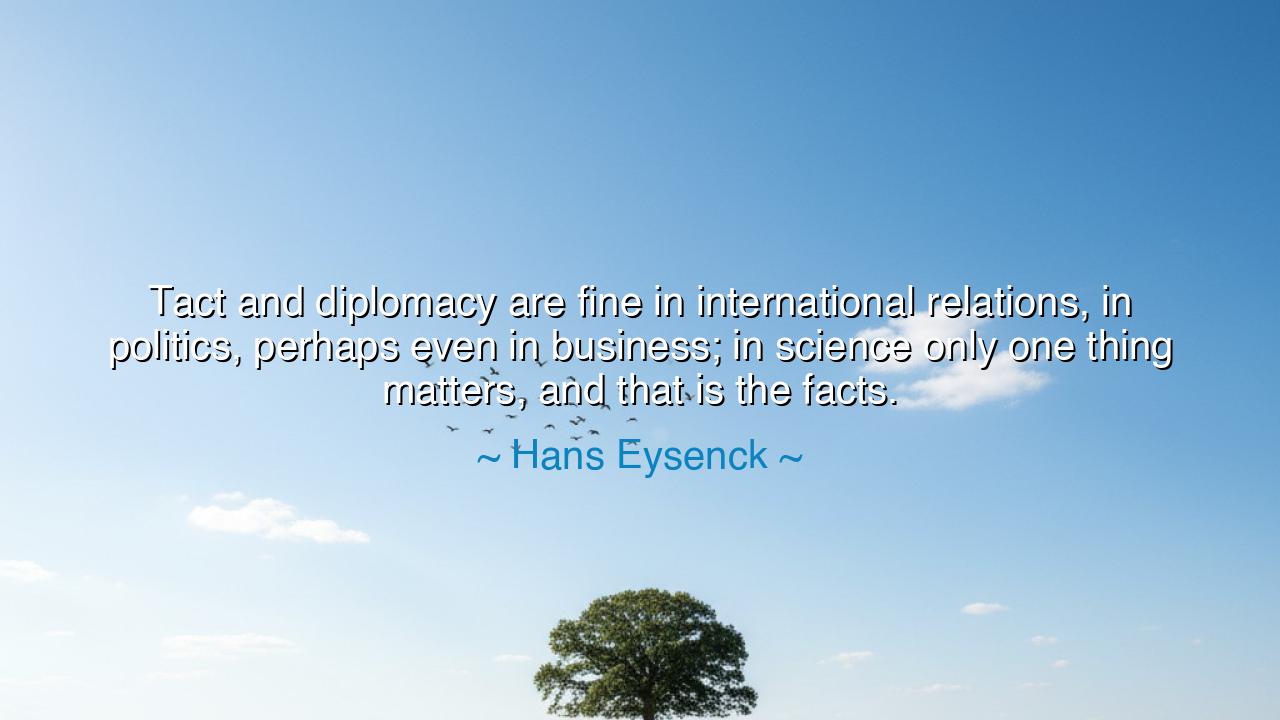
Tact and diplomacy are fine in international relations, in
Tact and diplomacy are fine in international relations, in politics, perhaps even in business; in science only one thing matters, and that is the facts.






Host: The room felt quiet, the soft hum of the evening settling in as the last remnants of daylight faded into the night. Jack sat at the table, a book open in front of him, but his thoughts were clearly elsewhere. Jeeny stood by the window, her fingers lightly pressing against the glass, as though the quote from Hans Eysenck had drawn her into deeper reflection. The words Jack had just read seemed to invite a conversation on the role of facts, objectivity, and the tension between them and the more subjective, nuanced aspects of life.
Jeeny: “I’ve been thinking about what Hans Eysenck said: ‘Tact and diplomacy are fine in international relations, in politics, perhaps even in business; in science only one thing matters, and that is the facts.’ It’s such a stark view, isn’t it? That in science, there’s no room for compromise or subtlety—it’s all about facts, about what can be proven, no matter how uncomfortable or inconvenient it might be.”
Jack: “It’s interesting because it feels like he’s drawing a hard line between the subjective and the objective. In politics or business, tact and diplomacy are essential because you’re dealing with people, with opinions, with emotions. But in science, he’s saying it’s all about facts—things that can be tested, proven, and verified. There’s no room for interpretation or compromise in the face of facts.”
Jeeny: “Yes, but it also raises the question of whether this idea of absolute objectivity is always possible, or even desirable. In the world of science, where facts are central, is it possible to fully separate the facts from the person presenting them, from their biases, from their background? Eysenck is making it sound like science is purely objective, but in reality, even the way we gather, interpret, and present facts can be influenced by human subjectivity.”
Host: The stillness in the room deepened as the weight of their conversation sank in. Jack’s fingers stopped moving over the pages of the book, his thoughts now focused entirely on the complexity of objectivity in science. Jeeny’s gaze moved from the window to Jack, the shared understanding of the difficulty in maintaining true objectivity quietly hanging between them.
Jack: “I get that. Even in the realm of science, where we value facts above all else, there are always biases—subtle ones, often unintentional. Researchers choose what to study, how to frame their questions, and even how to interpret data. It’s not like science exists in a vacuum, separate from the influence of human experience and judgment.”
Jeeny: “Exactly. And that’s where Eysenck’s view gets complicated. On one hand, science demands objectivity. It’s about discovering the truth, regardless of personal beliefs or opinions. But on the other hand, humanity is always part of the equation. The idea of being completely objective, completely detached from any personal influence, is something we might strive for, but it’s not always achievable in practice. Facts can be misinterpreted, manipulated, or framed in ways that reflect a certain agenda.”
Jack: “So, maybe the point isn’t about denying that subjectivity exists—it’s about striving for the most objective perspective we can. We should aim to approach facts with as little bias as possible, but recognize that complete objectivity is an ideal, not always a reality.”
Jeeny: “Yes, and that’s where the beauty of science comes in—it’s a process. It’s not about reaching absolute certainty or unchangeable truth, but about constantly refining our understanding, constantly testing and challenging what we know. Science is about evidence, not just facts in isolation, but how we interpret them, question them, and adjust our beliefs based on new information.”
Host: The room felt quieter now, the weight of their conversation settling into a deeper reflection on the nature of facts, objectivity, and the human influence that inevitably shapes the way we perceive the world. Jack’s fingers rested gently on the table, as if the conversation had sparked a new layer of understanding in the quiet space between them.
Jack: “I think the real value of science lies not in claiming to have all the answers, but in the process of constantly searching for them—of questioning and testing. Eysenck may be saying that facts are paramount, but those facts aren’t immune to the biases of the people who find them. It’s not about perfect objectivity; it’s about striving for accuracy while recognizing that human nature always plays a role.”
Jeeny: “Exactly. And maybe Eysenck is simply reminding us of the importance of facts in a world full of opinions and ideologies. Science is the one space where we can turn to evidence as the basis for knowledge, but even in science, we must remember that facts are only as strong as the rigor with which we approach them.”
Host: The room felt still now, as though the conversation had unraveled something deeper. The idea that facts are central to science, but that objectivity is an ideal we continually strive for rather than a perfect reality, had settled into a quiet truth between them. The importance of science lies not just in the facts themselves, but in the process of testing, refining, and constantly questioning what we think we know. In the end, it’s this ongoing process of inquiry, of striving for accuracy and truth, that allows us to move closer to a clearer understanding of the world.






AAdministratorAdministrator
Welcome, honored guests. Please leave a comment, we will respond soon